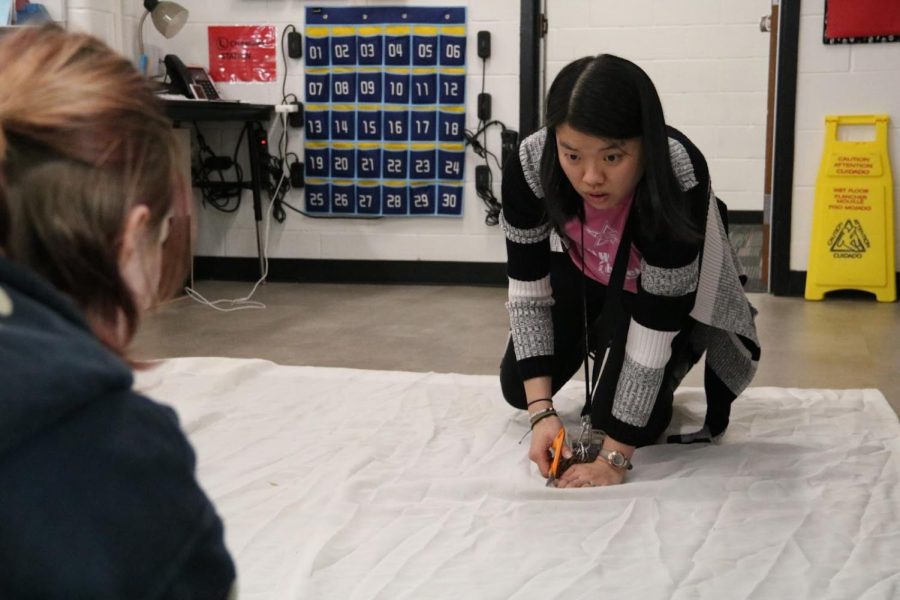Teacher of the Week: Hellyer building holistic foundation into technical theater
Coppell High School technical theater director Grace Hellyer assists with creating a curtain for the UIL One-Act Play on Wednesday. Hellyer has taught technical theater for four years, with this year being her first at Coppell High School.
February 23, 2023
With skills from a 15-year acting career on her belt, Coppell High School’s technical theater director Grace Hellyer has had her roots in acting and performing in front of an audience since she spent her days Chinese dancing as a child. Merging her two passions for educating and performing, Hellyer now heads the CHS technical theater department, enriching students to reach their goals as actors, performers and artists.
How would you describe your personal teaching style?
My personal teaching style relates to my reason for teaching my content. I am a strong believer that there is a place in theater for every single person. There’s a place for different types of actors and different types of technicians. Wanting to help students learn and make that connection for themselves is what drives me to be the kind of teacher that I am. I am really focused on real world application, on building relationships and having knowledge that you can take and apply to other locations, not just within a theater space.
Prior to your educational career, did you act or lean towards technical theater aspects?
I started as a performer. I have 15 years of training in traditional Chinese dance. I started being on stage when I was really, really young. So I was involved in all of the costumes, the dancing and the performance aspects. I was an actor in high school. When I was in my own theater classes, I was an actor. When I pursued it in college, I leaned specifically towards educational theater, so I kind of had to do both. That way, I could be prepared to teach, direct and train both actors and technicians.
What made you decide to use your theater experience as an educator?
I saw that as a merging of my two loves. I always loved theater, I always love the stage, performing, building and making it all happen. I also realized that I enjoyed breaking things down so that other people can understand and being really able to come alongside someone and help them learn and figure it out for themselves. I love that process. Seeing that there was an opportunity, an opening and a need for quality theater educators felt like it was like a job made for me.
What goals do you hope to accomplish this year?
Because it’s my first year [at CHS], I just want to see where we’re at. I always see my first year as kind of like a status check and then build my goals based on that. I think that there [are] a lot of really great things happening [at CHS] so I just want to build on that to help the students make things that they’re proud of and help them really see every part of the process. So that way, if they want to go out and do community theater, professional theater or go into a collegiate or professional program, they’re ready for that next step.
What is your most memorable teaching moment?
There was a day where I showed up to class and one of my students showed up to class and we had worn the same outfit. I call it a reverse twin, because we were the same colors, but on opposite ends. I wore a brown shirt and blue pants and he had worn a blue shirt and brown pants. He saw and was like, “Wait what, how did that happen?” That memory sticks out to me. It’s a really positive memory [that] is not really anything related to teaching necessarily, but just kind of showing how like being able to connect with students on a different level other than just being their teacher. So that way, they can learn all of the things that I’m exemplifying for them.
What is a lesson you have learned that you would like to pass onto your students?
To figure out when to let things go. I am very much a Type A perfectionist. I like things done a certain way and I like them to be done at a certain time. But I think I’ve had to hone the skill of knowing when is it the time to stick really hard and fast to those expectations and when is the time to kind of let some of those things go to figure out what the priority is at a certain time and be able to adapt and change to that versus sticking hard and fast to your expectations all the time.
What would you say is the most rewarding part about teaching?
When I hear my students tell each other something that I have told them. Instead of me having to remind them, they’ll say “Hey, don’t forget to do this, do it this way, don’t forget to do this,” and they are now able to internalize that and remind each other. So it’s showing that they are hearing, listening and applying the lessons and the ideas and practices that I’m trying to put into them.
What should students know before taking technical theater?
I think technical theater is a fun class. I think technical theater is the place where if you want to be an artist, if you want to create, if you want to build, if you want to design, then you need to be getting into a technical theater class, because that’s where we’re going to do all of those things.
Follow Aliya (@aliyafza) and @CHSCampusNews on Twitter.










